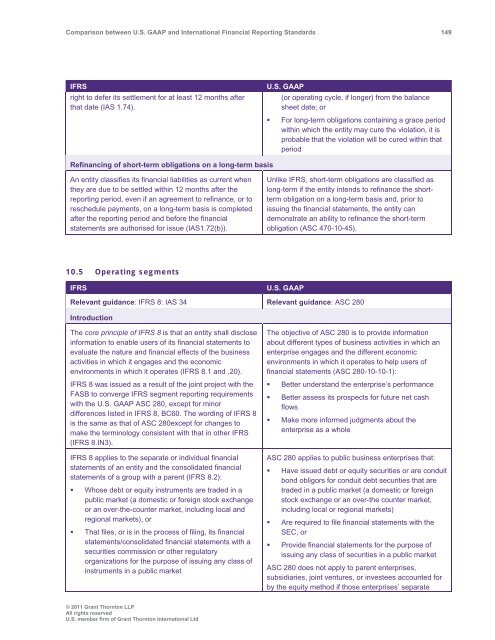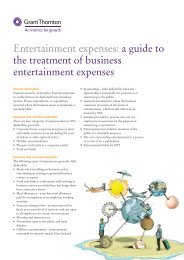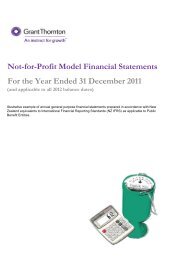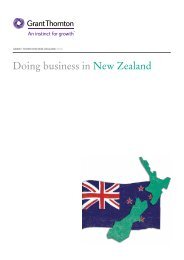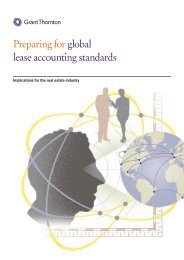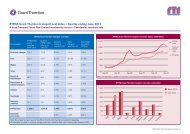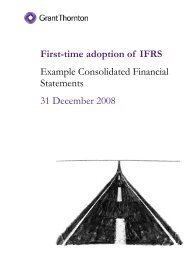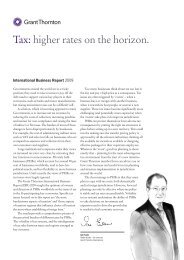Comparison between U.S. GAAP and International ... - Grant Thornton
Comparison between U.S. GAAP and International ... - Grant Thornton
Comparison between U.S. GAAP and International ... - Grant Thornton
You also want an ePaper? Increase the reach of your titles
YUMPU automatically turns print PDFs into web optimized ePapers that Google loves.
<strong>Comparison</strong> <strong>between</strong> U.S. <strong>GAAP</strong> <strong>and</strong> <strong>International</strong> Financial Reporting St<strong>and</strong>ards 149<br />
IFRS<br />
right to defer its settlement for at least 12 months after<br />
that date (IAS 1.74).<br />
U.S. <strong>GAAP</strong><br />
(or operating cycle, if longer) from the balance<br />
sheet date; or<br />
• For long-term obligations containing a grace period<br />
within which the entity may cure the violation, it is<br />
probable that the violation will be cured within that<br />
period<br />
Refinancing of short-term obligations on a long-term basis<br />
An entity classifies its financial liabilities as current when<br />
they are due to be settled within 12 months after the<br />
reporting period, even if an agreement to refinance, or to<br />
reschedule payments, on a long-term basis is completed<br />
after the reporting period <strong>and</strong> before the financial<br />
statements are authorised for issue (IAS1.72(b)).<br />
Unlike IFRS, short-term obligations are classified as<br />
long-term if the entity intends to refinance the shortterm<br />
obligation on a long-term basis <strong>and</strong>, prior to<br />
issuing the financial statements, the entity can<br />
demonstrate an ability to refinance the short-term<br />
obligation (ASC 470-10-45).<br />
10.5 Operating segments<br />
IFRS<br />
U.S. <strong>GAAP</strong><br />
Relevant guidance: IFRS 8: IAS 34 Relevant guidance: ASC 280<br />
Introduction<br />
The core principle of IFRS 8 is that an entity shall disclose<br />
information to enable users of its financial statements to<br />
evaluate the nature <strong>and</strong> financial effects of the business<br />
activities in which it engages <strong>and</strong> the economic<br />
environments in which it operates (IFRS 8.1 <strong>and</strong> .20).<br />
IFRS 8 was issued as a result of the joint project with the<br />
FASB to converge IFRS segment reporting requirements<br />
with the U.S. <strong>GAAP</strong> ASC 280, except for minor<br />
differences listed in IFRS 8, BC60. The wording of IFRS 8<br />
is the same as that of ASC 280except for changes to<br />
make the terminology consistent with that in other IFRS<br />
(IFRS 8.IN3).<br />
IFRS 8 applies to the separate or individual financial<br />
statements of an entity <strong>and</strong> the consolidated financial<br />
statements of a group with a parent (IFRS 8.2):<br />
• Whose debt or equity instruments are traded in a<br />
public market (a domestic or foreign stock exchange<br />
or an over-the-counter market, including local <strong>and</strong><br />
regional markets), or<br />
• That files, or is in the process of filing, its financial<br />
statements/consolidated financial statements with a<br />
securities commission or other regulatory<br />
organizations for the purpose of issuing any class of<br />
instruments in a public market<br />
The objective of ASC 280 is to provide information<br />
about different types of business activities in which an<br />
enterprise engages <strong>and</strong> the different economic<br />
environments in which it operates to help users of<br />
financial statements (ASC 280-10-10-1):<br />
• Better underst<strong>and</strong> the enterprise’s performance<br />
• Better assess its prospects for future net cash<br />
flows<br />
• Make more informed judgments about the<br />
enterprise as a whole<br />
ASC 280 applies to public business enterprises that:<br />
• Have issued debt or equity securities or are conduit<br />
bond obligors for conduit debt securities that are<br />
traded in a public market (a domestic or foreign<br />
stock exchange or an over-the counter market,<br />
including local or regional markets)<br />
• Are required to file financial statements with the<br />
SEC, or<br />
• Provide financial statements for the purpose of<br />
issuing any class of securities in a public market<br />
ASC 280 does not apply to parent enterprises,<br />
subsidiaries, joint ventures, or investees accounted for<br />
by the equity method if those enterprises’ separate<br />
© 2011 <strong>Grant</strong> <strong>Thornton</strong> LLP<br />
All rights reserved<br />
U.S. member firm of <strong>Grant</strong> <strong>Thornton</strong> <strong>International</strong> Ltd


